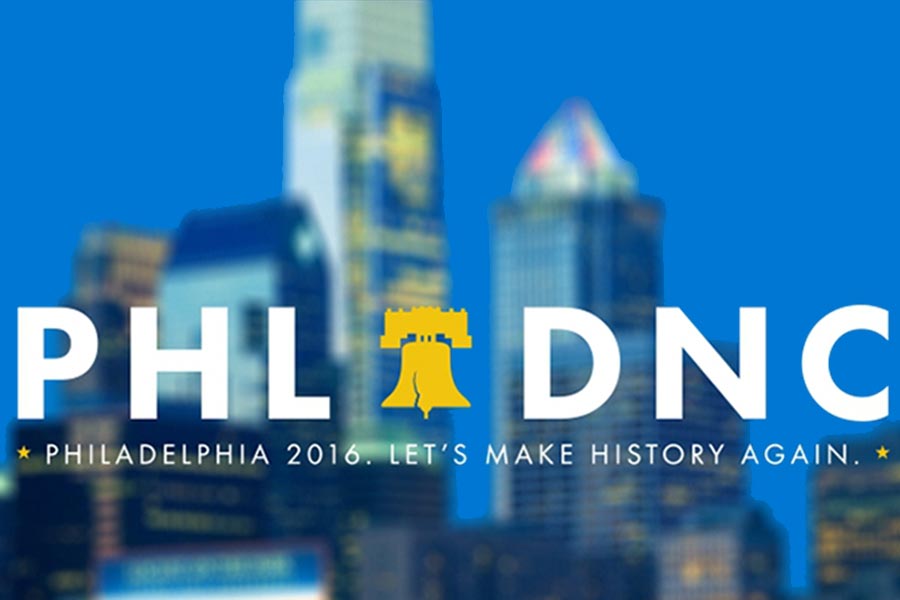Philadelphia’s LGBT delegates to the Democratic convention, many of them participating fort the first time in the political event, felt the excitement in rousing speeches by First Lady Michelle Obama and Hillary Clinton, the first female nominee for president.
The next step is to turn the excitement to action, the delegates said. Many took advantage of the opportunity to meet openly gay elected officials like Sen. Tammy Baldwin of Wisconsin and Rep. Mark Takano of California.
Malcolm Kenyatta, an activist from North Philadelphia, remembered a conversation he had with Takano.
“He said, ‘When we started pushing for marriage equality, right away people said, “How about civil unions?”’ He said, ‘No, that’s not enough.’”
“When we start having these fights, we win,” Kenyatta added. “If we have a commitment to recruiting and training LGBT candidates, we win.”
Going forward, Kenyatta said he hoped to see more focus on poverty as an LGBT issue. In Philadelphia, 250,000 people live in poverty or deep poverty. He said low wages contribute to LGBT youth homelessness and some people in the community feeling forced to sex work.
About 11.5 percent of the convention delegates were LGBT this year, a record amount, up from 7.8 percent in 2012. There were 28 transgender delegates, double the amount from the last convention.
Sherrie Cohen, a delegate for Sen. Bernie Sanders, said the Minnesota delegation had each individual wear a colored shirt to look like the rainbow. The Puerto Rican delegates also held the island’s flag in rainbow colors.
“I appreciated the tremendous presence of LGBT delegates and solidarity expressed by non-LGBT delegates,” said Cohen, who represented the same district as Kenyatta. “We need to maintain a high level of activism and involvement in this race.”
Kenyatta earned the second-most votes in the state to serve as a Pennsylvania delegate. He also worked as a whip for the Clinton campaign, sharing information between delegates and the campaign.
Sharron Cooks, an at-large Clinton delegate who lives in Philadelphia, was appointed to her role by state Rep. Brian Sims, the first-elected openly gay lawmaker in Pennsylvania. Cooks was the only transgender woman of color to serve as a delegate.
“There was a lot of history that was made during the convention and that experience will leave a legacy,” Cooks said. “Just being a delegate in itself is a huge responsibility. When you add intersectionality with race and gender, it’s even more responsibility.”
She said it stuck with her when Michelle Obama said, “When they go low, we go high,” referencing hateful rhetoric from the Republican ticket.
“When people are insulting you, you have to spread more love, more encouragement and more empowerment,” Cooks said.
At the transgender caucus, which was informally organized about an hour before the second LGBT Caucus meeting, Cooks said delegates talked about the work they’re doing in their states. She’s a community organizer who founded Making Our Lives Easier. Cooks added they have engaged with each other since the convention, and talks have started about how to get more transgender delegates to the 2020 convention.
“It’s clear we have a party that wants to work with us,” said Anne Wakabayashi, a Clinton delegate from Center City. “It’s clear we have their ear.”
Both Wakabayashi and Cohen stressed the importance of elections besides the presidency this fall.
“We need to have more Democrats in office if we want to see movement on our issues,” Wakabayashi said. “There’s just no other option.”
Wakabayashi also serves as executive director of Emerge Pennsylvania, an organization that recruits and trains women, including transgender women, to run for office. The Emerge network has locations in 16 states and many sent representatives to the Democratic convention in Philadelphia.
Wakabayashi added she has candidates in Delaware and Chester counties who could do great things for the community. She noted Clinton’s campaign does more than most to help down-ticket candidates. Wakabayashi said the excitement of a presidential election year typically drives higher turnout to the polls, which has historically been good for Democrats.
